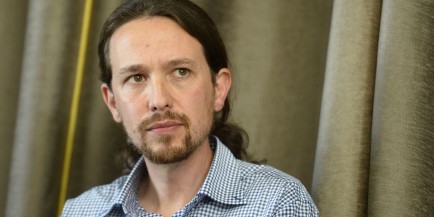
Pablo Iglesias, leader of Podemos and firebrand of Spain’s political landscape
A far-left populist political party has seemingly come from nowhere to top the opinion polls in Spain – just a few months before the country once again votes on a general election…
Podemos (which means ‘We can’) is led by the charismatic Pablo Iglesias and seeks to challenge the current status quo that has seen Spain’s economy suffer at the hands of the Eurozone monetary area and, more widely, European Union policies.
That, anyway, is Podemos’ rallying cry – and it is a cry that is currying favour with many disgruntled Spaniards. In the latest opinion polls Podemos had overtaken Spain’s two major parties – Mariano Rajoy’s right-of-centre ruling party PP and the left-of-centre PSOE.
According to last Wednesday’s Centro de Investigaciones Sociologicas (CIS) poll, Podemos is the preferred party of choice for 18 per cent of voters, placing it ahead of PSOE with 14 per cent, and PP with just 12 per cent.
This was just one poll, and CIS did reveal that if all previous voting patterns were taken into account then PP would still be – just – the leading party. However, the result has sent shockwaves across Spain’s political landscape, with Podemos’ ascent the first third-party to even threaten to break the two-party duopoly that has shaped Spanish politics since 1982.
Podemos already has five seats in the European Parliament and its policies – which chiefly revolve around a concerted effort to break the current set up of the Eurozone and bring more autonomy back to Spain – have evidently captured the public’s imagination.
“Podemos says it doesn’t want to leave the Eurozone,” said Open Europe political analyst Vincenzo Scarpetta. “But they are shadow eurosceptics. The plans they want to implement would make Spain incompatible with being in the euro.”
Iglesias, a 36-year-old college professor, is a gifted speaker, photogenic and, crucially, a young face; somebody seen as the perfect antidote to the typical image of the staid and grey Spanish politician.
And with young Spaniards more engaged than ever with politics, and a general election due in late 2015 or early 2016, his timing could well be perfect in building the required momentum to sweep him all the way to the position of Prime Minister.
It is a long shot, but these are tumultuous times for Europe in general, so who knows?
 en
en



 Vlaams-Nederlands
Vlaams-Nederlands
0 Comments
Leave a Comment
DISCLAIMER
The opinions and comments expressed by contributors to this Blog are theirs alone and do not necessarily reflect the views of VIVA Homes Under the Sun Ltd, any of its associated companies, or employees; nor is VIVA to be held responsible or accountable for the accuracy of any of the information supplied.
Have you got something to say?